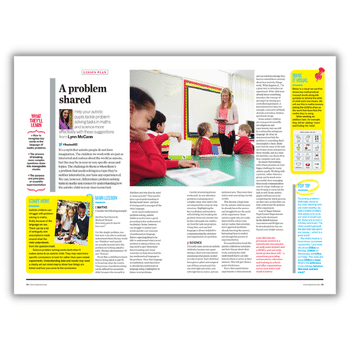“Scarce resources have been siphoned off”

With the government set to launch a major review of SEND support and services, the obvious question would seem to be, why now?

- by Teachwire

It was a surprise when the government announced in September this year that another SEND review was being planned. Though the DfE had previously indicated it would be reviewing the current SEND Code of Practice before the end of 2020, nothing had been said about a wider review, which raises the question of why this is being considered now, before the SEND reforms of 2014 have had time to become fully embedded.
Looking at how the reforms are working out in practice, however, one overriding reason for change stands out. The 2014 reforms saw the SEND support system expanded to cover individuals from birth until the age of 25, which was rightly applauded – but what seems to have been overlooked is the cost of providing this support to what’s now a wider group of young people. With pupil numbers rising, the proportion of those pupils with SEND higher than ever and school resources finite, staff are coming under increasing pressure.
Involving young people and their families in the decisions that affect them, and joining up the services by changing statements into education, health and care plans was absolutely the right approach to take. Yet what happened was that LAs and educational psychologists had to cope with their usual volume of requests for new assessments, while also having to transfer all of their existing Statements to EHCPs. This led to some LAs adopting a ‘cut and paste’ approach to meet deadlines, resulting in EHCPs of poor quality.
Despite schools’ and SENCos’ best efforts, many have struggled to meet the needs of those on SEN support. Cutbacks in funding and staffing have been exacerbated by a reduction in specialist support services that schools can draw on, in turn prompting parents to seek the security of an EHCP for their children and driving demand for special school placements, which can be considerably more expensive than mainstream provision.
There’s also been a significant rise in the volume of cases being dealt with by the SEND Tribunal, often due to dissatisfaction with the content of EHCPs and LAs’ refusals to assess for them. As a result, scarce resources have been siphoned off from supporting pupils with SEND.
All in all, the reforms have piled pressure on a system lacking the capacity to meet increasing demand, and it’s this which would appear to be driving the push for yet another review. What’s encouraging, however, is that the DfE isn’t seeking additional evidence, but is pulling together evidence they already have, including individual Ofsted/CQC local area SEND inspection results, the National Audit Office’s recent report on support for pupils with SEND in England and the Education Select Committee’s report of its SEND inquiry.
The proposed new SEND review will evaluate the impact of the 2014 reforms in order to identify the actions needed to improve services for children and families. The areas under examination will include how to ensure that high quality support is available in all areas; the role of healt and how specific conditions are driving demand; and the continuing need to balance an inclusive mainstream with specialist provision.
An interim report is expected by the end of the year, with a final report due in Spring 2020. Political turmoil notwithstanding, if this timetable is adhered to it will mean that only a limited amount of time will be spent on reviewing existing reviews before the government comes up with some answers.
Many of us had high hopes for the SEND reforms, but it has since become clear that not enough thought was given to the cost of putting them in place. A very careful eye will be required in future to ensure that in trying to make the SEND system viable, the quality of delivery doesn’t go out of the window…
Dr Rona Tutt OBE is a former chair of the NAHT Special Education Needs Committee











